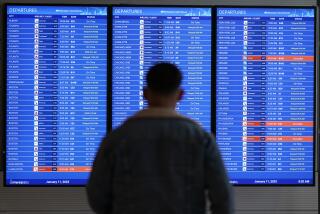FAA Termed ‘Ill-Prepared’ for Safety Role : GAO Says It Will Be Years Before Agency Can Act Effectively
- Share via
WASHINGTON — The Federal Aviation Administration is ill-prepared to assure airline compliance with safety regulations and may not be capable of monitoring air carriers adequately for years, a congressional study said today.
The preliminary report by the General Accounting Office was presented to the House aviation subcommittee at a time when the FAA already is under fire from many members of Congress for not having enough experienced air traffic controllers and airline inspectors.
The GAO findings are in the second installment of a long examination of the FAA’s inspection procedures stemming from 1984, but congressional staffers said they also reflect changes the agency has made recently and current conditions.
“In short,” Herbert R. McClure of the GAO told the House aviation subcommittee, “the FAA at present cannot say with assurance that airlines are complying with safety regulations.”
Training Inadequate
Among the findings of the GAO investigators:
--The FAA currently does not know how its inspector force is being used and how many inspectors are assigned to various sectors of the airline industry.
--Training for current inspectors is inadequate, with new training programs postponed because of the need to give new inspectors initial training. Training records of a sample of 17 inspectors in the Northwest region showed that none had received all the training considered necessary.
--FAA regulations and handbooks for inspectors continue to be “obsolete, incomplete or ambiguous.”
--An FAA computer system that is supposed to improve inspector staffing and distribute safety information has encountered numerous problems and “is unlikely to provide usable nationwide data for the next several years.”
While the report noted FAA plans to hire additional inspectors through the next fiscal year, it concluded that the agency is “ill-prepared” to absorb such an increase. It said “it will be years before all the needed internal management controls, inspector training and . . . supervisory managerial oversight will be in place” to make full use of the added manpower.
More to Read
Inside the business of entertainment
The Wide Shot brings you news, analysis and insights on everything from streaming wars to production — and what it all means for the future.
You may occasionally receive promotional content from the Los Angeles Times.










